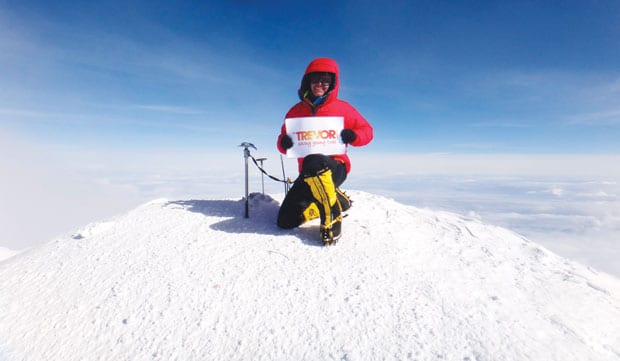20-year-old gay mountaineer Cason Crane turned a climb into a queer cause

REMARKABLE HEIGHTS | Cason Crane gave new meaning to the phrase ‘gay sports summit’ when the 20-year-old reached the top of Everest as a fundraiser for the Trevor Project.
DAN WOOG | Contributing Writer
outfield@qsynidcate.com
The welcome page of Cason Crane’s website asks, “What’s your Everest?” He’s not being metaphorical. Crane — an adventurer, athlete and activist — has actually climbed Mt. Everest.
He’s also traveled to over 70 countries on all seven continents and climbed seven of the world’s highest mountains. He’s rafted through uninhabited jungles, ridden a horse across Mongolia and backpacked through the most remote corners of the world. He has also volunteered at orphanages in China and Ethiopia, helped save elephants in Sri Lanka and interned for non-profits in the Middle East.
The fact that he is just 20 years old — and gay — is just part of his remarkable story.
Crane credits his parents with constantly pushing him to try new things. Growing up near Princeton, N.J., team sports were not his thing, but he was outdoorsy. After climbing Mt. Kilimanjaro with his mom at age 15, Crane realized that achieving a summit (setting a goal, then enjoying the satisfaction and view upon reaching it) suited his personality.
The next year, a very close friend at Choate Rosemary Hall committed suicide. Crane wanted to do something, so he ran Choate’s Gay-Straight Alliance. Crane had come out two years earlier, as a freshman. “It never occurred to me not to come out,” he says, describing his life after realizing he was gay. “It’s a non-story.”
Family and friends accepted him warmly. “It wasn’t a huge deal. I talked about guys like guys talked about girls,” he recalls. A four-year, three-sport varsity athlete (cross country, swimming and track), he had no problems with teammates, though “occasionally in the locker room I felt like Moses parting the Red Sea [when] guys on other teams avoided me as I walked through.” He shrugged it off.
As he neared graduation in 2011, Crane realized he could combine his love of mountain climbing with his interest in LGBT youth advocacy. He defered entrance into Princeton University, concentrating instead on scaling Everest. But attempting to scale the world’s most famous mountain wasn’t a vanity project — he was raising money and awareness for the Trevor Project.
In March, he flew to Nepal and met his support team. “Trust is very important on a climb like this,” he observes. He already knew and trusted one person: his mother. “She trekked in with me. That was really cool.”
The two-month expedition involved a series of climbs from the 18,000-foot base camp to adjust to the dangerous altitude. Meanwhile, the group waited for a “good weather window.” It arrived in mid-May. At 4 a.m. on May 21, Crane reached the summit of the world’s tallest peak.
The feeling was like nothing he’d ever experienced. Four months later, he struggles to describe the moment. “The sun lit up the horizon. It was so beautiful, I cried,” he recalls. He watched the spectacle for 45 minutes, trying to remember every image. “Everest symbolizes so much. There I was at 20, on top of the world.”
Crane’s climb symbolizes the journey many gay people take, he says: one step at a time, reaching their own “Everest.” It also had the tangible effect of raising $135,000 for the Trevor Project, and inspiring people he’s never met, all around the world.
This month, Crane comes back to earth. He’s returned from halfway around the world, to a college eight minutes from home. With no mountains in New Jersey, he looks forward to studying international relations and Arabic.
Of course, Crane will remain active, too. He plans to return to triathlon competitions. He’s signed up for his second Ironman. One day in August, he capped a 20-mile bike ride with a five-mile run — nothing special … except the day before, he’d returned from a trip to North Korea.
Training hard for a grueling competition is one more Everest-type test. But it’s one Cason Crane welcomes.
“As a young gay man, I see people facing challenges every day,” he says. “They’re proud of what they accomplish. And I’m proud because they’re proud.”
This article appeared in the Dallas Voice print edition October 11,, 2013.

